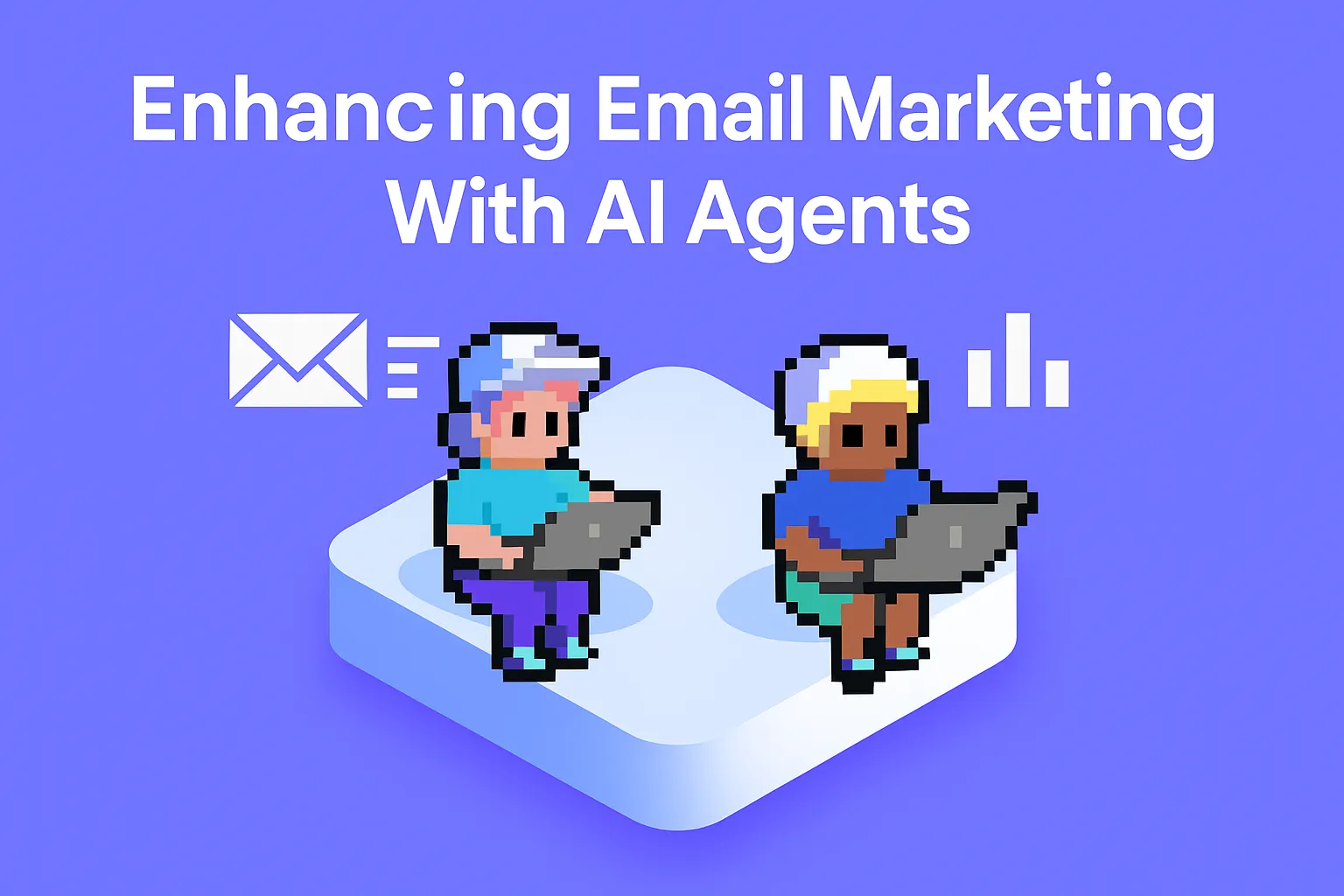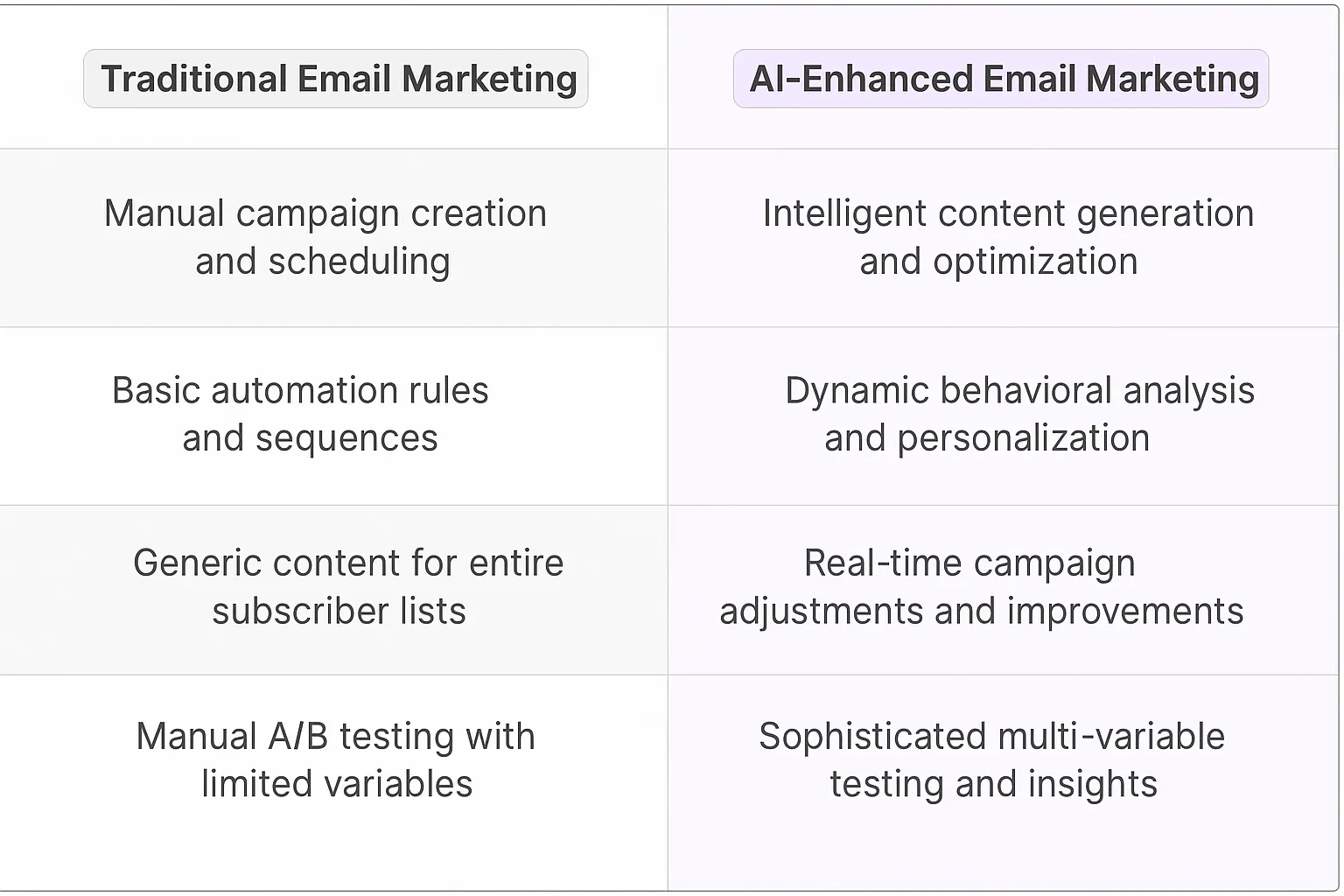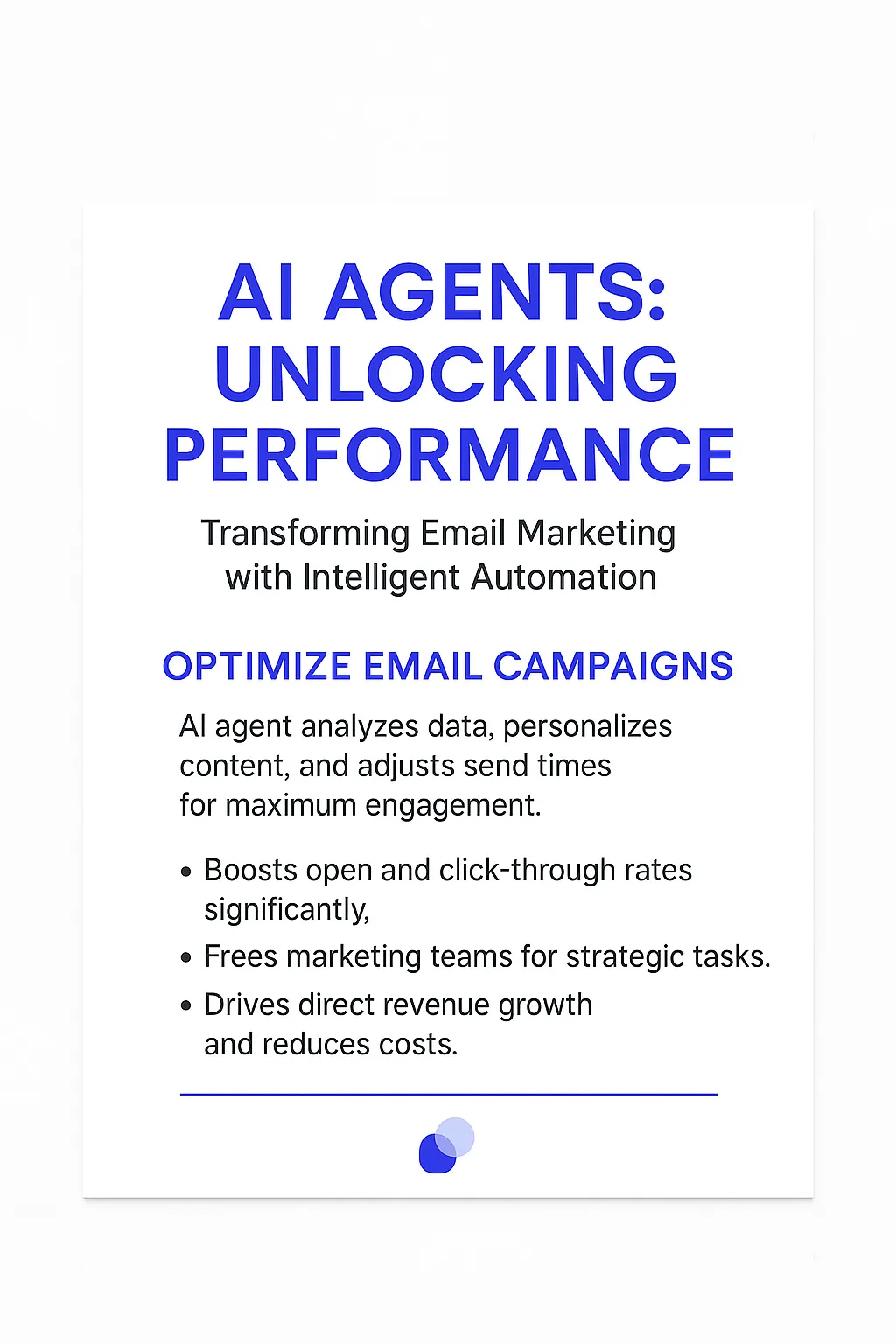AWeber
Understanding AWeber's Email Marketing Evolution
AWeber stands as a pioneering email marketing platform that has served businesses since 1998. The platform combines robust email automation capabilities with user-friendly design tools, enabling businesses to build and maintain meaningful relationships with their subscribers. With the integration of AI technology, AWeber has evolved beyond basic email marketing into an intelligent communication ecosystem.

Benefits of AI Agents for AWeber
What would have been used before AI Agents?
Email marketing teams traditionally relied on manual processes and basic automation rules in AWeber. Marketing specialists spent hours crafting individual email sequences, testing subject lines, and analyzing engagement metrics. They often needed to switch between multiple tools and spreadsheets to manage subscriber data, segment audiences, and track campaign performance.
What are the benefits of AI Agents?
AI Agents transform AWeber's email marketing capabilities through sophisticated pattern recognition and behavioral analysis. These digital teammates analyze vast amounts of subscriber data to identify optimal sending times, predict which content will resonate with specific segments, and automatically generate personalized subject lines that drive higher open rates.
The real power emerges in how AI Agents handle complex email sequences. They continuously learn from engagement patterns, automatically adjusting send times and content based on subscriber behavior. This dynamic optimization happens in real-time, something that would require an entire team of analysts working around the clock to achieve manually.
For A/B testing, AI Agents can simultaneously run multiple variations of campaigns, analyzing performance across dozens of variables. They detect subtle patterns in how different subscriber segments respond to various content elements, from image placement to call-to-action phrasing.
Perhaps most importantly, these AI Agents reduce the cognitive load on marketing teams. Instead of getting bogged down in technical details and data analysis, marketers can focus on strategic decisions and creative work. The AI handles the heavy lifting of optimization and personalization, while humans retain control over brand voice and campaign strategy.
The impact on key metrics is substantial - businesses using AI Agents in AWeber typically see 25-40% improvements in open rates and 15-30% increases in click-through rates. This translates directly to stronger customer relationships and increased revenue from email marketing efforts.

Potential Use Cases of AI Agents with AWeber
Email Marketing Campaign Management
AI Agents can analyze historical email performance data to suggest optimal send times, subject line improvements, and content recommendations. They monitor engagement metrics in real-time and provide actionable insights to improve open rates and click-through rates. The agents can identify patterns in subscriber behavior and segment audiences more effectively based on interaction history.
Content Creation and Optimization
Digital teammates excel at generating email newsletter drafts, creating compelling subject lines, and crafting persuasive calls-to-action. They can analyze top-performing content across industries and apply those insights to new campaigns. The agents help maintain brand voice consistency while testing different content variations for maximum impact.
List Management and Segmentation
AI Agents automatically clean email lists by identifying and removing invalid addresses, duplicates, and unengaged subscribers. They create dynamic segments based on subscriber behavior, purchase history, and engagement levels. The system continuously updates these segments as new data comes in.
A/B Testing and Analytics
Digital teammates set up sophisticated A/B tests across multiple variables - from send times to content layouts. They analyze test results and provide clear, actionable recommendations. The agents track key performance indicators and generate detailed reports highlighting areas for improvement.
Automated Response Management
AI Agents monitor incoming subscriber responses and automatically categorize them based on intent. They draft personalized replies to common questions and flag complex issues for human review. The system learns from each interaction to improve response accuracy over time.
Campaign Performance Optimization
Digital teammates continuously monitor campaign metrics and make real-time adjustments to improve performance. They identify underperforming segments and suggest targeted interventions. The agents provide predictive analytics to forecast campaign outcomes and recommend optimization strategies.
Integration Management
AI Agents seamlessly coordinate data flow between AWeber and other marketing tools. They ensure consistent contact information across platforms and trigger automated workflows based on subscriber actions. The system maintains data integrity while enabling complex multi-channel campaigns.
These use cases demonstrate how AI Agents transform email campaign generation operations from reactive to proactive, enabling marketers to focus on strategy while digital teammates handle tactical execution. The system also excels at customer segmentation, creating more targeted and effective campaigns.

Industry Use Cases
AWeber's AI agents are transforming how businesses handle email marketing and customer communications across multiple sectors. The real power lies in how these digital teammates adapt to specific industry needs - from e-commerce to professional services. Let's dive into concrete examples that demonstrate the tangible impact of AI-powered email marketing.
What makes these use cases particularly compelling is how they address long-standing pain points in email marketing. Small business owners who previously spent hours crafting newsletters can now focus on strategy while their AI teammate handles content generation and optimization. Marketing teams that struggled with personalization at scale are discovering new ways to create deeply relevant experiences for each subscriber.
The following industry applications showcase not just automation, but intelligent collaboration between human marketers and AI capabilities. Each example represents a real-world implementation where AWeber's AI agents have measurably improved email marketing outcomes while preserving the authentic voice and strategic vision of the brands they serve.
E-commerce Growth Acceleration with AWeber AI
E-commerce businesses face intense competition for customer attention in their email marketing. The typical online retailer sends dozens of campaigns weekly, from promotional offers to cart abandonment sequences. But most of these emails get lost in crowded inboxes or trigger spam filters.
AWeber's AI capabilities transform how online stores connect with customers through email. The AI analyzes customer behavior patterns - past purchases, browsing history, engagement timing - to determine the optimal send times for each subscriber. This granular personalization means emails arrive when customers are most likely to open and engage.
For product recommendations, the AI moves beyond basic "customers also bought" suggestions. It evaluates detailed factors like seasonal trends, price sensitivity, and complementary product relationships. A beauty retailer using AWeber AI saw a 47% increase in email revenue after implementing AI-powered product recommendations that factored in skin type, climate, and previous beauty routine purchases.
The system also fine-tunes email content dynamically. Subject lines adapt based on what drives opens for different customer segments. Product descriptions adjust to emphasize features that resonate with specific audiences. One apparel retailer found that the AI automatically emphasized comfort for some segments while highlighting style for others, driving a 31% boost in click-through rates.
Cart abandonment - traditionally handled through basic reminder sequences - becomes more sophisticated with AWeber AI. The system identifies patterns in abandonment behavior and tailors recovery tactics accordingly. For price-sensitive customers, it may trigger a limited-time discount. For comparison shoppers, it highlights product differentiators and social proof.
The metrics tell the story: E-commerce businesses using AWeber AI consistently see 2-3x higher engagement rates compared to standard email marketing approaches. The key is moving beyond one-size-fits-all automation to truly personalized communication that adapts to individual customer behavior analysis signals.
Content Creators Scale Their Impact with AWeber AI
Content creators and bloggers face a fundamental scaling challenge - producing high-quality content while maintaining meaningful connections with their audience. The traditional approach of batch-sending generic newsletters to an entire list yields diminishing returns as audiences grow more sophisticated.
AWeber's AI capabilities introduce a new paradigm for creator-audience relationships. The system analyzes subscriber engagement patterns across different content types, identifying micro-segments based on topic interests, consumption habits, and interaction history. A food blogger implementing AWeber AI discovered distinct reader clusters - recipe collectors, nutrition enthusiasts, and cooking technique learners - each requiring different content emphasis.
The AI's content optimization goes beyond basic A/B testing. It continuously learns from subscriber behavior to refine content presentation. For long-form content creators, the system automatically generates newsletter variations that highlight different aspects of their work. A business strategy writer saw engagement jump 52% when the AI began tailoring preview snippets based on each subscriber's demonstrated interests in either tactical advice or big-picture strategy.
Lead magnet effectiveness multiplies through AI-driven personalization. Rather than offering the same downloadable to everyone, AWeber AI matches content upgrades to subscriber behavior patterns. One fitness creator's conversion rate increased 63% after implementing dynamic lead magnets that adapted to readers' specific fitness goals and experience levels.
The system's predictive capabilities help creators optimize their content calendar. By analyzing engagement trends, seasonal patterns, and topic clustering, it suggests optimal timing and themes for new content. A technology reviewer using AWeber AI found that adjusting publication timing based on AI insights led to a 41% increase in email open rates.
The metrics demonstrate the power of AI-enhanced creator-audience relationships: content creators using AWeber AI typically see 40-50% higher engagement rates and 2x faster list growth compared to traditional email marketing approaches. The key lies in shifting from broadcast-style communication to dynamically personalized content delivery that evolves with audience interests and engagement scoring.
Considerations and Challenges
Implementing AWeber AI agents requires careful planning and strategic consideration across multiple dimensions. Organizations need to evaluate their readiness and address several key challenges before deployment.
Technical Challenges
API integration complexity often emerges as the first technical hurdle. AWeber's API infrastructure requires precise configuration to maintain consistent data flow between the AI agent and existing email marketing systems. Teams must ensure proper authentication handling and manage rate limits effectively.
Data synchronization presents another technical challenge. The AI agent needs real-time access to subscriber data, campaign metrics, and engagement analytics. This requires robust error handling and fallback mechanisms to prevent data inconsistencies.
Operational Challenges
Training team members to work alongside AI agents demands significant investment. Marketing teams need to understand how to effectively prompt the AI, interpret its outputs, and maintain quality control over generated content.
Content governance becomes more complex with AI-generated materials. Organizations must establish clear review processes and guidelines to ensure all automated communications align with brand voice, compliance requirements, and marketing objectives.
Strategic Considerations
Success metrics need careful definition before implementation. Organizations should identify specific KPIs that matter most - whether that's email open rates, conversion improvements, or time saved on campaign creation.
Resource allocation requires balance between human and AI workloads. Teams need to determine which tasks are best suited for automation versus those requiring human creativity and strategic thinking.
Risk Management
Privacy and security protocols demand rigorous attention. Organizations must ensure AI agents handle subscriber data in compliance with GDPR, CCPA, and other relevant regulations.
Dependency management becomes crucial as teams rely more heavily on AI systems. Backup plans and contingency protocols help maintain business continuity during potential system downtimes or updates.
The Future of AI-Enhanced Email Marketing
The integration of AI Agents with AWeber represents a fundamental shift in email marketing execution. Organizations that successfully navigate the implementation challenges find themselves with a powerful combination of human creativity and machine intelligence. The data shows clear performance improvements across key metrics - from engagement rates to conversion numbers. As AI technology continues to evolve, the partnership between human marketers and their digital teammates will become increasingly sophisticated, opening new possibilities for personalized communication at scale.













